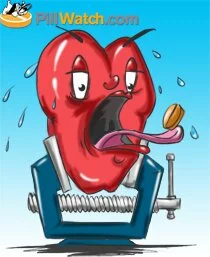
Nitrates (e.g. nitroglycerin) are the drugs used to treat and prevent the onsets of chest pain or angina, heart attacks, hypertension and for the management of congestive heart failure. Very often these medications are the first-line therapy for fighting these dangerous heart disorders.
Nitrates include a number of different agents: nitroglycerin (Nitrek, Nitrogard, Nitrol), isosorbide mononitrate (Ismo, Imdur), isosorbide dinitrate (Coronex – in Canada, Isordil), erythatyl tetranitrate, pentaerythritol tetranitrate, and sodium nitroprusside.
Nitrates are vasodilators. They relax vascular smooth muscle resulting in the dilation of the veins, arteries, and coronary arteries. Lowering of the blood pressure is a logical consequence of nitrates action.
These drugs benefits include the improvement of the blood flow to the heart, decrease in the ventricular preload and oxygen demand by the heart. As a result of the nitrates action angina pain is effectively relieved. It is also known that the given drugs are capable of relieving subendocardial ischemia.
Although nitrates are very effective in relieving angina pain, they have a great weak-point: if used for a long period of time, tolerance for their action is developed in the vessels, primarily in the arteries, though partial tolerance is also observed in the veins. This happens because vascular smooth muscle loses sensitivity to nitrates. Therefore, the smallest effective dose for pain relief is advised. Patients are also recommended to use nitrates on a short-term basis or with nitrates-free periods.
A combination therapy of a nitrate and a beta blocker or calcium channel blocker is also a way to avoid the development of drug tolerance.
The usual side effects during the treatment with nitrates are headaches, dizziness, nausea, vomiting, and flushing. However, these are not serious and do not require medical treatment. Headaches may be relieved with the help of aspirin or acetaminophen; moreover, they are experienced only at the beginning of the nitrates use.
Adverse reactions, which are potentially dangerous, are tachycardia, allergic reactions, blurred vision, dry mouth, weakness and fainting. These cases must be medically helped.
Patients with anemia and hypotension, those who have had a stroke, transient ischemic attack,
heart failure or serious head injury should use nitrates with special caution. A physician must evaluate the possibility of the treatment with these drugs.
Nitroglycerin is sometimes contraindicated in patients with severe aortic stenosis or hypertrophic obstructive cardiomyopathy.
Other cases when nitrates therapy can be forbidden are the use of erectile dysfunction drugs (Viagra, Levitra, and Cialis) and dihydroergotamine medications. The benefits of nitrates treatment must overwhelm the risks during pregnancy and breast-feeding; both (benefits and risks) are evaluated by the doctors.
Do not use nitrates with alcohol – this may result in significant lowering of blood pressure.
Nitrates come in different forms: tablets (Nitrogard, Ismo), sublingual tablets (Nitrek, Nitrol, Nitrogard, Isordil), transmucosal (intrabuccal) tablets (Nitrol, Nitrogard), sustained-release tablets and capsules (Isordil, Imdur), ointments (Nitrol), sprays (Nitrek, Nitrol, Nitrogard) and transdermal patches (Nitrek, Nitrol). Consequently, the way they are used is defined by the form of the drug. Frequency and dosing is often defined by a doctor or the medicines are used in accordance with the instructions in the data sheet.
Sublingual tablets are taken only when necessary. They are put under the tongue to dissolve and get absorbed into the bloodstream. The action begins as soon as the pills are taken. It is not recommended to take more than tree pills in 15 minutes.
Topical nitrates are applied onto the skin every 4-8 hours to control angina pain. The places of application must be changed in order to avoid skin irritation.

Sprays should not be shaken before the administration of the drug onto or under the tongue. Medication should neither be inhaled nor swallowed. One or two sprays can relieve angina attack. Not more than three doses of the drug are allowed in 15-minutes period.
Patches are applied on the hairless parts of the body and changed every 12-14 hours.
Transmucosal tablets are put either between the lip and gum above the upper incisors or between the cheek and gum. They should be allowed to dissolve slowly (3 to 5 hours).
As a matter of fact, different forms of nitrates can be used for treating angina, as well as for preventing and stopping acute angina pain attacks.
An important thing to remember about nitrates is that the treatment should never be stopped suddenly, since it can cause a severe angina attack.
| Tip for you : Sign-in with Your OpenID and post faster, easier and with easy access to all your past posts. | |
|
Your Nick: |














